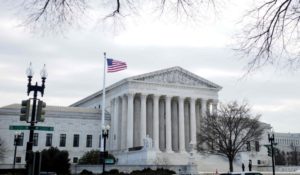
OSHA withdraws rule requiring COVID-19 vaccine and testing mandates for larger businesses, Justice Breyer announces retirement, and more…
IN THE NEWS
- The U.S. Department of Labor’s Occupational Safety and Health Administration (OSHA) withdrew its rule that would have required businesses with 100 or more employees to implement COVID-19 vaccination and testing policies. OSHA’s action follows the U.S. Supreme Court’s decision that blocked this vaccine-or-test rule. Despite the withdrawal, OSHA still encouraged workers to get vaccinated because of the ongoing health risks “posed by COVID-19 in the workplace.”
- Supreme Court Justice Stephen Breyer will retire in October, at the end of the current Supreme Court term. President Joseph R. Biden has pledged to nominate a Black woman to the Court to fill the vacancy and intends to do so by the end of February. Justice Breyer’s retirement announcement provides relief to the Democrat Party, who feared that a delay in Justice Breyer’s retirement and a loss of their majority in Congress could preclude their ability to confirm a liberal successor to the Court.
- The Supreme Court will review the test for determining whether wetlands are entitled to receive protection under the Clean Water Act as “waters of the United States.” The Act gives the federal government authority to regulate water bodies classified as waters of the United States—a classification that has been contested over the years. An earlier Supreme Court decision articulated two definitions for wetland regulation in plurality opinions, or two opinions where there was no majority rule. In the present case, a federal appeals court applied one of the plurality tests, instructing that the Clean Water Act governs wetlands if they have a “significant nexus” with waters that are traditionally regulated, such as lakes and rivers. The party that filed the suit against the U.S. Environmental Protection Agency (EPA), however, asserts that wetlands only receive federal protection if they have a “continuous surface water connection” to traditionally regulated waters—a narrower construction that would result in fewer federally protected wetlands.
- The Supreme Court agreed to hear challenges to policies considering race in college admissions—often referred to as affirmative action. The challenges arose out of one lawsuit filed against Harvard University and one against the University of North Carolina at Chapel Hill by a group called Students for Fair Admissions. The Supreme Court previously upheld the University of Texas at Austin’s use of race in its admissions process in 2016 by a vote of four to three following the death of Justice Antonin Scalia and the recusal of Justice Elena Kagan. Legal scholars posit that the changed composition of the court since 2016 means that the court could now rule differently on the constitutionality of the use of race as a factor in admissions processes.
- The U.S. Securities and Exchange Commission (SEC) announced new proposed measures to change the reporting requirements for private equity firms and hedge funds. The SEC’s proposal would amend a reporting form known as Form PF, which was created following the 2007-2009 financial crisis. The proposal changed the information that firms are required to report, such as significant losses, and increased the number of firms subject to the reporting requirements. The SEC stated that the amendments to Form PF would increase the Commission’s ability to analyze systemic risks in the financial sector as the private fund industry now manages $11 trillion in assets.
- EPA announced that it would take several actions to address pollution concerns in “historically and disproportionately impacted” communities. These actions include more aggressive inspection of facilities that appear not to comply with anti-pollution mandates, air quality monitoring and enforcement, and agency pressure on businesses and state and local policymakers to take action against pollution. EPA Administrator Michael S. Regan said that residents of impacted communities “have suffered far too long and local, state, and federal agencies have to do better.”
- The Financial Crimes Enforcement Network of the U.S. Department of the Treasury proposed a rule to establish a pilot program that would permit U.S. financial institutions to share suspicious activity reports with their foreign branches and subsidiaries. Currently, institutions must file suspicious activity reports when they believe a transaction may be affiliated with unlawful activity but do not share the reports. The proposed rule would account for confidentiality and data security concerns. Network acting director Himamauli Das said the pilot program would “assist financial institutions in further combating illicit finance risks.”
- Arizona Governor Doug Ducey sued the Biden Administration in an effort to prevent the Treasury Department from taking back COVID-19 federal relief funds. In a letter, the Treasury Department reportedly threatened to revoke the funding and stop future funding unless the state stopped using the funds to back programs that specifically help schools that do not have mask mandates, explaining that Arizona’s programs undermined efforts to curb COVID-19. In the lawsuit, Ducey claimed the Treasury Department exceeded its authority in conditioning the funds on public health mandates.
WHAT WE’RE READING THIS WEEK
- In a report for the Center for American Progress (CAP), Tyler Gellasch, the executive director of the Healthy Markets Association, and Andres Vinelli, the vice president of economic policy at CAP, argued for a regulatory framework to govern conflicts of interest in the process for including companies in certain investment products known as index funds. Gellasch and Vinelli explained how index funds passively track certain segments of the stock market known as indexes, and that certain companies stand to gain access to large amounts of capital by virtue of their inclusion in a given index. The “broad discretion” indexes have in determining their membership has created the need to establish clear guidelines and principles for governing indexes to avoid conflicts of interest.
- In a public comment letter submitted to the Federal Acquisition Regulatory Council, the New York University School of Law Institute for Policy Integrity and several other environmental nonprofits advocated a procurement approach that accounts for climate impacts. The Council—a group consisting of the U.S. Department of Defense, the U.S. General Services Administration, and the National Aeronautics and Space Administration oversees and advises the U.S. government’s goods and services procurement policy. The Institute argued that the Council’s goal of considering the social cost of greenhouse gases in its procurement decisions could best be met by directing agencies to apply social cost values when evaluating bids on government contracts and requiring binding emissions reductions clauses in contracts when estimates are unavailable.
- In a paper, Harald Halbhuber, research fellow at New York University School of Law, performed a functional analysis of the economic substance of special purpose acquisition companies (SPACs). Halbhuber discussed how companies use SPACs to merge with private companies to take them public—an alternative to initial public offerings (IPO), which is the first public offering of securities a private entity makes as it transitions to a public company. During the merger process with a SPAC, Halbhuber explained, investors in a SPAC must choose whether to sell their shares or hold them as an investment in the target company. Halbhuber argued that the SEC should regulate holdings in a SPAC merger like it would the purchase of stock in the target company.
FLASHBACK FRIDAY
- In an essay for The Regulatory Review, Jon Devine, director of Federal Water Policy at the Natural Resources Defense Council, and David Henkin, an attorney at Earthjustice, praised the Supreme Court’s 2020 decision in County of Maui v. Hawaii Wildlife Fund, which clarified that the Clean Water Act applies to pollutants that travel via groundwater into surface water. Devine and Henkin explained that in April 2019, the Trump Administration issued an interpretative statement that declared the Clean Water Act does not apply to groundwater, reversing decades of prior EPA practice. Devine and Henkin noted that Justice Breyer, who wrote the opinion for the Court, criticized the Trump Administration’s guidance as antithetical to the purpose of the Act.



